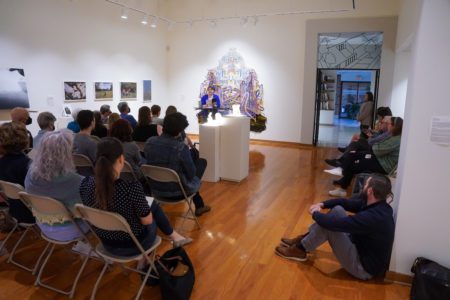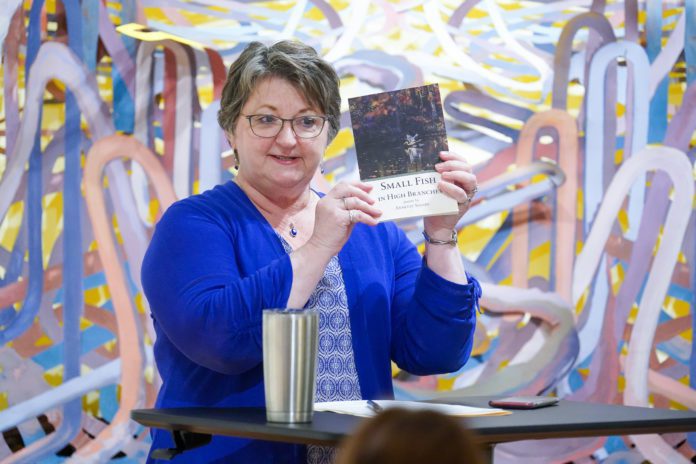Belmont Professor of English Annette Sisson recently published her first full-length book of poetry, “Small Fish in High Branches.” The book follows the 2019 publication of her chapbook, “A Casting Off,” and several awards including 2021 Mark Strand Poetry Scholar for the Sewanee Writers’ Conference, winner of The Porch Writers’ Collective’s 2019 Poetry Prize, as well as 2020 BOAAT Writing Fellow.
We spoke with Sisson following her reading at Belmont’s Bunch Library about inspiration, perseverance, and her lifelong love of poetry. She provided a selection from her latest book below, which can be purchased locally at Parnassus Books and Barnes & Noble, Vanderbilt—and online at Amazon Books and Glass Lyre Press.
In your bio, there’s a quote from George Eliot: “It’s never too late to be what you might have been.” Can you talk about how these words have been an inspiration to you?
I always was inclined to write, and I loved poetry. When I was an undergraduate student, I was an English lit major, but a creative writing minor. Later, when I went to graduate school, I wanted to be a literature professor but still hoped to keep practicing creative writing. I applied for my first graduate poetry seminar in creative writing, which was part of Indiana University’s new MFA program, and wasn’t admitted to the workshop. You had to submit poetry, and the professor who rejected me said, “You know, we hope you’ll try again, but we have so many new MFA students who are here for writing, some of whom already have books published. We just don’t have a space for you right now.” Well, I interpreted that as “you don’t make the cut” and never tried again.
What kept you writing then?
I worked on the staff of the “Indiana Review” and hung out with a lot of writers. My best friend was a Medievalist whose father was a fairly famous poet, and she also wrote poetry. And my first husband, whom I met in grad school, was a poet.
Consequently, I was admitted into poetry circles with my friends. They would show me their work, and I would offer feedback. When they had poetry groups, sometimes I would tag along, and so I felt like I was always learning, but I was busy trying to get my PhD in Victorian literature and wasn’t writing poetry myself. I did attend many poetry readings during that time and read poetry of all types.
Over the years, I found that at times when a lot was going on in my life personally, I would return to writing. So when we moved to Nashville and I left behind my community from graduate school, I started writing even though I had an unfinished dissertation to deal with and got pregnant immediately with my son. In all that transition I started writing again, and I published a few poems—like, two.

My first husband and I ended up divorcing, and I eventually married Jimmy Davis, who is a Communications professor here at Belmont. When we had our daughter, I was off with her for six months and did some writing. Then I got very involved with Belmont again—I was the Director of General Education for eight years, the Faculty Senate President, and held other roles in leadership and administration. And I had three children to raise—so many things to juggle. For that reason, I continued to repress the fact that I wanted to be writing. This changed in 2017 when my mother got her third cancer diagnosis.
About halfway through that year, I went to a workshop led by Judy Skeen in the College of Theology & Christian Ministry. One of the activities she engaged us in to help us decompress from the semester was to write, and I found myself working on a poem. I came home and kept messing with the poem. And then I thought, “Wait a minute. My mom finally let herself start painting when she was 50. I wrote my dissertation on a woman named Mary Ann Evans, who wrote under the name George Eliot (author of the quote above). She didn’t start writing novels until she was 42, which was old for a Victorian woman, and she’s very famous for the seven novels that she wrote.” I told my husband, “Somehow, I have to keep writing. I’m really tired of repressing this urge.” And he was like, “Well, let’s see if we can try to arrange your life so we can make space for it.” To be honest, it’s still a struggle. As an English professor I constantly face millions of papers to be graded. I find that I can find time to write in the summers and sometimes over the breaks and at the beginning of the semester before the papers pile on. After that, all I can do is edit and submit poems now and then.
When did you first take an interest in poetry?
My mother read poetry to me, and I started playing piano when I was 5. People have told me that my poems are musical—lyrical—and I think that’s true. I memorized poetry when I was a little girl, and then in the third grade, we had a poetry project. I was super-excited about it because I was assigned to write poetry myself. I wrote a poem for that project that my mother thought was very good. She entered it in a local newspaper contest, and it won honorable mention. All the others who won were much older than I was, and a reading was held for the winners. I read my poem of course, but what I remember most was being wowed by the older students and their modern-sounding poems that didn’t even rhyme. I was so intrigued—I hadn’t known free verse poetry existed.
We hear that one of your favorite places to write is in the passenger seat of a car, can you talk about that?
Yeah, also on trains in England. When I get in a car or on a train, my mind just goes everywhere. We often take trips back and forth to Indiana to see my family, and my husband has family down south. I get in the passenger seat, take out my notebook, and start writing down what’s floating through my mind. My husband says I’ll be doodling and kind of writing and so forth, and then “all of a sudden you’re gone.” Eventually I’ll come back and ask him, “Do you want to hear a really crappy draft?” It’s rare that a poem comes out even close to the form in which it ends up.
Would you be willing to share one of your poems from the latest collection?
I wrote this poem about my parents, who had many challenges and struggles throughout the 64 years of their marriage. My father had not been a very involved parent to his four children, and so it was with great surprise that we watched him help my mother decide, when she received her terminal cancer diagnosis, that she would die at home and that he would care for her as her health declined. While she still could, she taught him how to do laundry and clean the house and helped him expand his cooking skills—and then when she could no longer perform these duties, he not only took them over, but also applied himself to the task of tending to her medical needs and daily care.
Her Cosmos They built a cottage from the forest’s growth, consecrated it through rituals of morning, routines of seasons, leaves dropping, budding, greening— sealed by the thick mud of their life’s steep slog. Now at dark he lifts her from chair to bed, sees the last of her tomorrows emerge from the trees, the deer gathered, grazing in the front yard, nipping the tips of the fig trees. And he knows when they come again from the undergrowth, rising from their wild nests, come to taste whatever new has grown, she too will rise carrying a loose bouquet of cosmos, like those she planted beside the porch, some dropping silent on grass, as she retreats into mist and branches, a veil of darkening shimmer.



